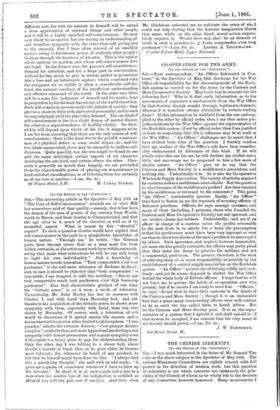CO-OPERATION FOR THE ARMY.
(TO THE EDITOR OF THE "SPECTATOR.")
Sin,—Your correspondent, "An Officer Interested in Can. teens," in the Spectator of May 25th disclaims for the War Office all responsibility for the discouragement of the Roch- dale system as carried on for the Army by the Canteen and Mess Co-operative Society. May I ask him to account for the following fact? Why is it that early information as to the movements of regiments is unobtainable from the War Office by that Society, though sought through legitimate channels, whereas it is somehow always obtainable by certain trading firms ? If this information be withheld from the one and sup. plied to the other by official order, then I say that undue pre- judice is shown by the War Office against the representative of the Rochdale system ; if not by official order, then lam justified at least in suspecting that illicit influence may be at work in the War Office. "An Officer" challenges me to assert that I have studied both sides of the question. I frankly confess that my studies of the War Office's side have been consider- ably embarrassed by dilemmas of this kind. If he will kindly solve this one for me, he will further my studies not a little, and encourage me to propound to him a few more of similar nature. "An Officer" goes on to say that the Canteen and Mess Society is a middleman's association, and nothing else. Undoubtedly it is. So is also the Co-operative Wholesale Supply Association. The variety of articles required by canteens makes a middleman unavoidable. But the question is, what becomes of the middleman's profits? Are they retained by the middleman or returned to the consumer ? This point "An Officer" conveniently ignores. Lastly, "An Officer" tries hard to fasten on me the reproach of accusing officers of dishonest practices. Officers, he says, manage canteens, and many of them (including, I presume, those who founded the Canteen and Mess Co-operative Society) are not ignorant, and are neither cheats nor robbers. Undoubtedly; and yet if an officer in charge of a canteen raises the profits returnable to the men from 5s. to nearly 14s. a head, the presumption is that his predecessor must have been very ignorant or very careless to allow two-thirds of the men's profits to be intercepted by others. Such ignorance and neglect, however lamentable, are none the less greatly excusable, for officers may justly plead that they enter the Army to practise the military, and not a commercial, profession. The greater, therefore, is the need of relieving them of as much responsibility as possible by the establishment of a central supply-association on the Rochdale system. "An Officer " accuses me of bitting wildly and reck- lessly; and yet he seems disposed to shelter the War Office behind the whole body of British officers. I hope that he will not force me to pursue the battle of co-operation over this ground; but if he insists I am ready to meet him. "Officers," he says, "do not wish to leave their canteens in the hands of the Canteen and Mess Society " ; though it is an undeniable fact that a great many commanding officers were well content to do so until the war called them to South Africa. But let the Canteen and Mess Society pass. It is as the repre- sentative of a system that I uphold it and shall uphold it; if that system be accepted, I am content that the very name of the Society should perish.—I am, Sir, &c., 59a Brook Street, W. J. W. FORTESCUE.






































 Previous page
Previous page